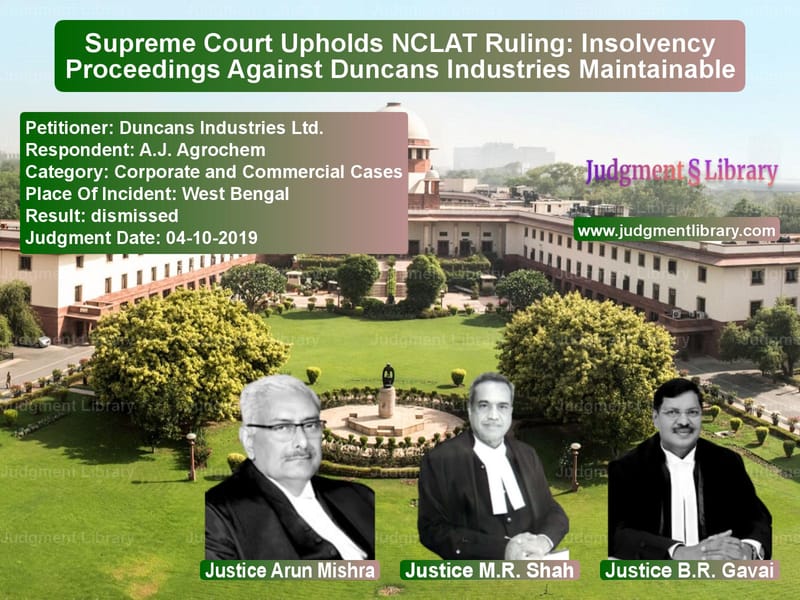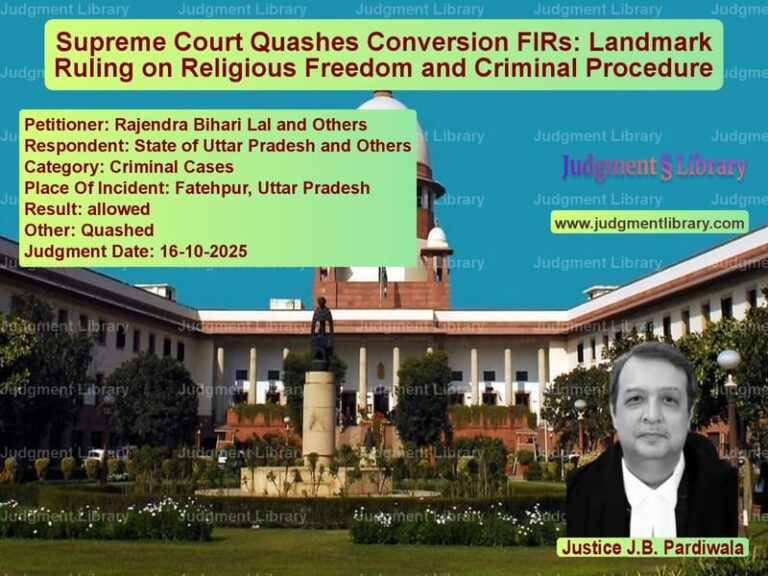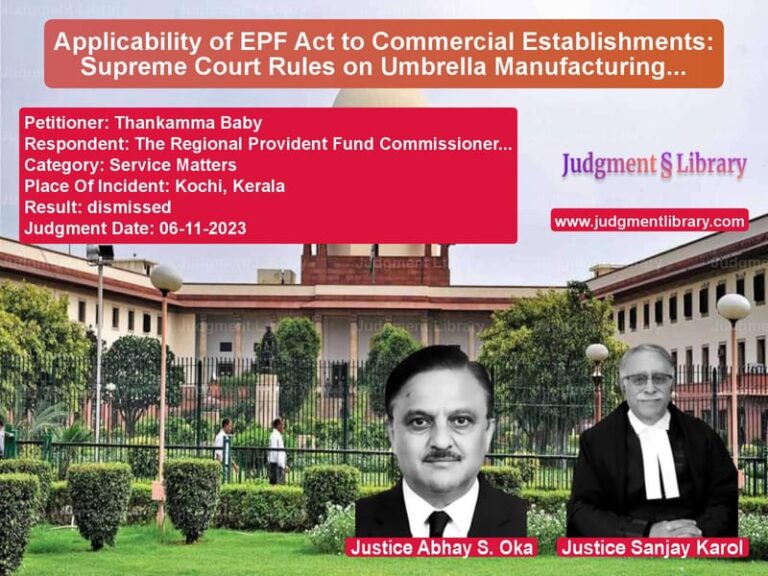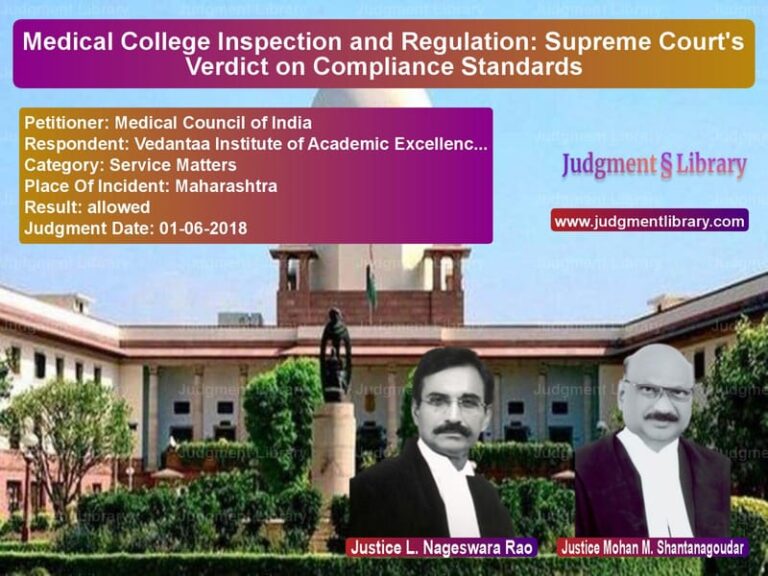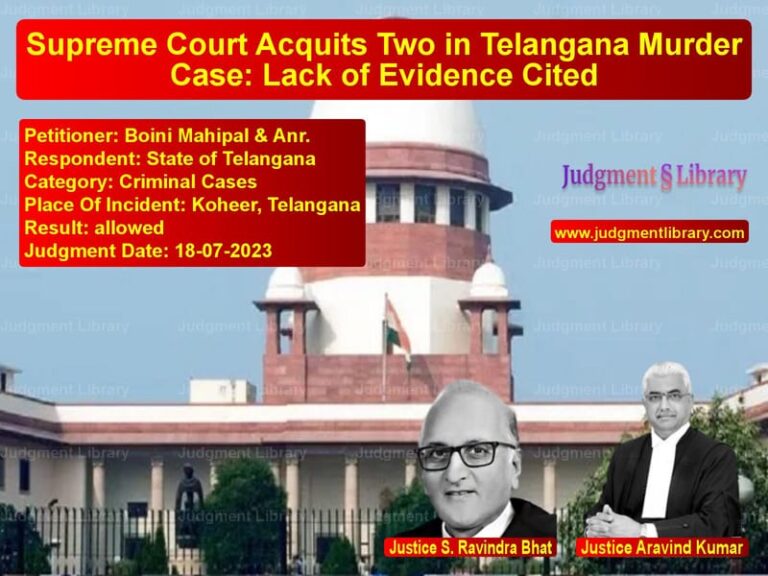Supreme Court Upholds NCLAT Ruling: Insolvency Proceedings Against Duncans Industries Maintainable
The case of Duncans Industries Ltd. v. A.J. Agrochem revolved around the applicability of the Insolvency and Bankruptcy Code, 2016 (IBC) in relation to companies operating under the Tea Act, 1953. The Supreme Court ruled that insolvency proceedings under the IBC can proceed against tea companies without the prior approval of the Central Government, thereby upholding the National Company Law Appellate Tribunal’s (NCLAT) decision.
Background of the Case
Duncans Industries Ltd., the appellant in this case, owns and manages 14 tea gardens. Seven of these gardens were taken over by the Central Government under Section 16E of the Tea Act, 1953, citing mismanagement and public interest concerns.
A.J. Agrochem, the operational creditor, supplied pesticides, insecticides, and herbicides to Duncans Industries. The company allegedly failed to pay an outstanding amount of Rs. 41,55,500. Consequently, A.J. Agrochem initiated insolvency proceedings under Section 9 of the IBC before the National Company Law Tribunal (NCLT), Kolkata.
The appellant opposed the insolvency petition, arguing that under Section 16G(1)(c) of the Tea Act, 1953, no winding-up proceedings or the appointment of a receiver could be initiated without the prior approval of the Central Government. The NCLT accepted this argument and ruled that the proceedings were not maintainable.
A.J. Agrochem appealed to the NCLAT, which overturned the NCLT ruling. The tribunal held that the insolvency petition under the IBC was valid, even without the Central Government’s approval. Duncans Industries then appealed to the Supreme Court.
Arguments by the Appellant (Duncans Industries Ltd.)
The appellant raised the following arguments:
- The Tea Act is a special law enacted to regulate and protect the tea industry, and it takes precedence over the IBC.
- Under Section 16G of the Tea Act, the prior approval of the Central Government is mandatory before initiating any winding-up or insolvency proceedings against a tea company.
- Since the Central Government had taken control of some of the tea gardens, insolvency proceedings would disrupt public interest and employment in the tea industry.
- The Tea Act and IBC should be harmoniously construed to ensure the objectives of both laws are met.
Arguments by the Respondent (A.J. Agrochem)
The operational creditor contended:
- The IBC is a complete code that overrides other laws, including the Tea Act.
- The requirement of prior approval under Section 16G applies only to winding-up proceedings, whereas the insolvency resolution process aims to revive the company.
- Section 238 of the IBC explicitly states that its provisions have an overriding effect on other laws.
- Since Duncans Industries continued to manage the tea gardens despite the government’s notification, the argument about government control was not applicable.
Supreme Court’s Observations
The Supreme Court, led by Justices Arun Mishra, M.R. Shah, and B.R. Gavai, ruled:
“The IBC is a complete code in itself, and its provisions override the Tea Act, 1953, in case of any conflict. The insolvency process is intended to revive the company rather than wind it up, making Section 16G(1)(c) of the Tea Act inapplicable.”
The Court emphasized:
“Section 238 of the IBC states that its provisions will have effect notwithstanding anything inconsistent contained in any other law. The IBC was enacted to ensure a timely resolution of financial distress, and allowing companies to evade insolvency proceedings by relying on the Tea Act would defeat its purpose.”
Further, the Court rejected the appellant’s argument that insolvency proceedings equate to winding-up proceedings, stating that:
“The corporate insolvency resolution process under the IBC is not the same as winding-up under the Companies Act. The goal of IBC is to protect the corporate debtor from liquidation and facilitate revival. Section 16G(1)(c) of the Tea Act applies only to winding-up proceedings and not to insolvency resolution.”
Final Judgment
The Supreme Court ruled:
- The insolvency petition under Section 9 of the IBC is maintainable against Duncans Industries Ltd.
- No prior approval from the Central Government is required under Section 16G of the Tea Act before initiating insolvency proceedings under the IBC.
- The NCLAT ruling allowing the insolvency petition was upheld, and the appeal was dismissed.
Conclusion
This ruling sets a significant precedent, clarifying that the IBC has an overriding effect over industry-specific regulations like the Tea Act. The judgment ensures that tea companies cannot avoid insolvency proceedings by invoking special provisions under the Tea Act. By reaffirming the objective of the IBC, the Supreme Court reinforces the principle that financial recovery and creditor rights take precedence over industry-specific statutory restrictions.
Petitioner Name: Duncans Industries Ltd..Respondent Name: A.J. Agrochem.Judgment By: Justice Arun Mishra, Justice M.R. Shah, Justice B.R. Gavai.Place Of Incident: West Bengal.Judgment Date: 04-10-2019.
Don’t miss out on the full details! Download the complete judgment in PDF format below and gain valuable insights instantly!
Download Judgment: Duncans Industries L vs A.J. Agrochem Supreme Court of India Judgment Dated 04-10-2019.pdf
Direct Downlaod Judgment: Direct downlaod this Judgment
See all petitions in Bankruptcy and Insolvency
See all petitions in Corporate Compliance
See all petitions in Judgment by Arun Mishra
See all petitions in Judgment by Mukeshkumar Rasikbhai Shah
See all petitions in Judgment by B R Gavai
See all petitions in dismissed
See all petitions in supreme court of India judgments October 2019
See all petitions in 2019 judgments
See all posts in Corporate and Commercial Cases Category
See all allowed petitions in Corporate and Commercial Cases Category
See all Dismissed petitions in Corporate and Commercial Cases Category
See all partially allowed petitions in Corporate and Commercial Cases Category

